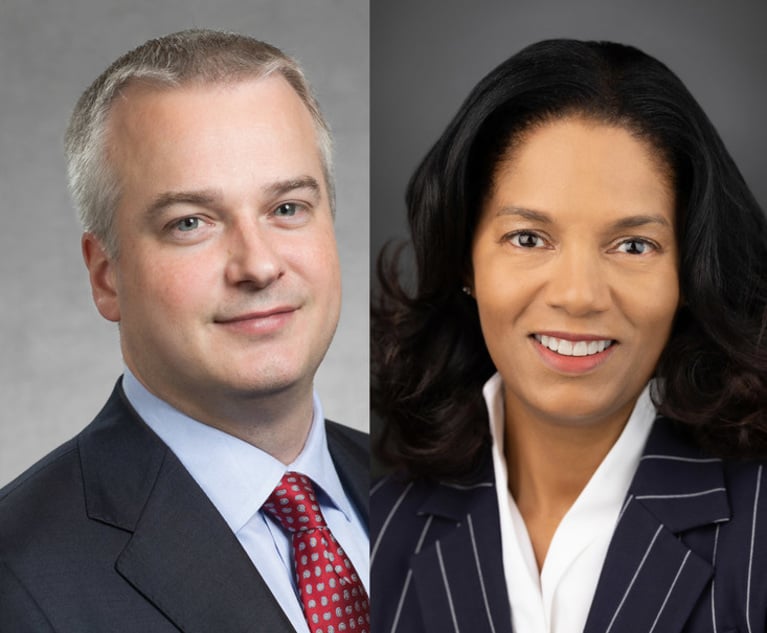 Uber and Sidecar (Photo: Diego Radzinschi/Courtesy photo)
Uber and Sidecar (Photo: Diego Radzinschi/Courtesy photo)Uber and Gibson Dunn Beat Back Monopoly Claims
Defunct ridesharing company Sidecar will have the opportunity to amend its antitrust claims against Uber by Feb. 4.
January 21, 2020 at 05:09 PM
3 minute read
The original version of this story was published on The Recorder
Uber Technologies and its Gibson, Dunn & Crutcher counsel shrugged off claims from shuttered ridesharing startup Sidecar that Uber surged into new markets and deployed anti-competitive tactics to create a monopoly.
On Tuesday, U.S. District Chief Magistrate Judge Joseph Spero of the Northern District of California granted Uber's motion to dismiss Sidecar's amended complaint, which alleged Uber acted as a monopolist to drive Sidecar and other companies out of business.
For instance, Sidecar contends that Uber has "turned its guns" on Lyft, to the point that the ridesharing competitor does not attempt to compete on pricing anymore. Yet, Spero said he was bound by the Ninth Circuit's ruling in Rebel Oil v. Atlantic Richfield, which held such arguments insufficient to support a claim under the Sherman Act.
"Even if the court accepts Sidecar's allegations that Uber can raise prices above competitive levels by disciplining Lyft, this court is not free to depart from the Ninth Circuit's holding that, without action by Congress, such oligopoly power must 'slip past' the Sherman Act's prohibitions," Spero wrote.
Spero said that not all of Uber's arguments presented grounds for dismissal, including Uber's assertion that it was exempt from monopolization claims because it entered the non-limousine ridehailing segment one year after Sidecar and Lyft. Still, Sidecar did not allege "a cognizable market power or a dangerous probability" of Uber obtaining such power, Spero wrote.
However, Sidecar will have the chance to amend its Sherman Act claims by Feb. 4, because Spero ruled that it is "conceivable that Sidecar could allege that Uber can unilaterally raise market prices by restricting its output."
As for the defunct company's claims under California's Unfair Practices Act, the judge tossed those with prejudice.
Uber said it is pleased that the court recognized the deficiencies in the complaint brought by SC Innovations, which succeeded Sidecar after the company shut down operations. "Uber operates in an intensely competitive environment and the case is nothing more than an attempt to monetize the remnants of a failed business," an Uber spokesperson said.
McKool Smith and Zelle now represent Sidecar in the case after Gibson Dunn sought to remove its original Quinn Emanuel Urquhart & Sullivan counsel over claims the law firm argued for Uber in more than 20 suits. Spero disqualified the Quinn Emanuel team in May, ruling that the firm repped a substantially similar case for Uber involving a taxi car company.
Kirk Dillman of McKool Smith Hennigan's Los Angeles office said SC Innovations plans to amend its complaint according to the court's order, so that it can hold Uber accountable for its anticompetitive conduct.
Gibson Dunn did not immediately respond to requests for comment Tuesday afternoon.
This content has been archived. It is available through our partners, LexisNexis® and Bloomberg Law.
To view this content, please continue to their sites.
Not a Lexis Subscriber?
Subscribe Now
Not a Bloomberg Law Subscriber?
Subscribe Now
NOT FOR REPRINT
© 2024 ALM Global, LLC, All Rights Reserved. Request academic re-use from www.copyright.com. All other uses, submit a request to [email protected]. For more information visit Asset & Logo Licensing.
You Might Like
View All
Litigators of the Week: A Trade Secret Win at the ITC for Viking Over Promising Potential Liver Drug

Trending Stories
- 1Gibson Dunn Sued By Crypto Client After Lateral Hire Causes Conflict of Interest
- 2Trump's Solicitor General Expected to 'Flip' Prelogar's Positions at Supreme Court
- 3Pharmacy Lawyers See Promise in NY Regulator's Curbs on PBM Industry
- 4Outgoing USPTO Director Kathi Vidal: ‘We All Want the Country to Be in a Better Place’
- 5Supreme Court Will Review Constitutionality Of FCC's Universal Service Fund
Who Got The Work
Michael G. Bongiorno, Andrew Scott Dulberg and Elizabeth E. Driscoll from Wilmer Cutler Pickering Hale and Dorr have stepped in to represent Symbotic Inc., an A.I.-enabled technology platform that focuses on increasing supply chain efficiency, and other defendants in a pending shareholder derivative lawsuit. The case, filed Oct. 2 in Massachusetts District Court by the Brown Law Firm on behalf of Stephen Austen, accuses certain officers and directors of misleading investors in regard to Symbotic's potential for margin growth by failing to disclose that the company was not equipped to timely deploy its systems or manage expenses through project delays. The case, assigned to U.S. District Judge Nathaniel M. Gorton, is 1:24-cv-12522, Austen v. Cohen et al.
Who Got The Work
Edmund Polubinski and Marie Killmond of Davis Polk & Wardwell have entered appearances for data platform software development company MongoDB and other defendants in a pending shareholder derivative lawsuit. The action, filed Oct. 7 in New York Southern District Court by the Brown Law Firm, accuses the company's directors and/or officers of falsely expressing confidence in the company’s restructuring of its sales incentive plan and downplaying the severity of decreases in its upfront commitments. The case is 1:24-cv-07594, Roy v. Ittycheria et al.
Who Got The Work
Amy O. Bruchs and Kurt F. Ellison of Michael Best & Friedrich have entered appearances for Epic Systems Corp. in a pending employment discrimination lawsuit. The suit was filed Sept. 7 in Wisconsin Western District Court by Levine Eisberner LLC and Siri & Glimstad on behalf of a project manager who claims that he was wrongfully terminated after applying for a religious exemption to the defendant's COVID-19 vaccine mandate. The case, assigned to U.S. Magistrate Judge Anita Marie Boor, is 3:24-cv-00630, Secker, Nathan v. Epic Systems Corporation.
Who Got The Work
David X. Sullivan, Thomas J. Finn and Gregory A. Hall from McCarter & English have entered appearances for Sunrun Installation Services in a pending civil rights lawsuit. The complaint was filed Sept. 4 in Connecticut District Court by attorney Robert M. Berke on behalf of former employee George Edward Steins, who was arrested and charged with employing an unregistered home improvement salesperson. The complaint alleges that had Sunrun informed the Connecticut Department of Consumer Protection that the plaintiff's employment had ended in 2017 and that he no longer held Sunrun's home improvement contractor license, he would not have been hit with charges, which were dismissed in May 2024. The case, assigned to U.S. District Judge Jeffrey A. Meyer, is 3:24-cv-01423, Steins v. Sunrun, Inc. et al.
Who Got The Work
Greenberg Traurig shareholder Joshua L. Raskin has entered an appearance for boohoo.com UK Ltd. in a pending patent infringement lawsuit. The suit, filed Sept. 3 in Texas Eastern District Court by Rozier Hardt McDonough on behalf of Alto Dynamics, asserts five patents related to an online shopping platform. The case, assigned to U.S. District Judge Rodney Gilstrap, is 2:24-cv-00719, Alto Dynamics, LLC v. boohoo.com UK Limited.
Featured Firms
Law Offices of Gary Martin Hays & Associates, P.C.
(470) 294-1674
Law Offices of Mark E. Salomone
(857) 444-6468
Smith & Hassler
(713) 739-1250








